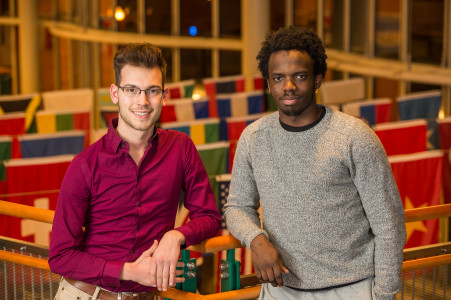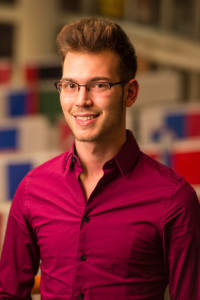After one round of voting, Dan Davis ’16 was elected SGA President with 58.54 percent of the vote, Dixon Romeo ’16 won the position of Vice President of Student Affairs with 68.34 percent, and after winning 49.92 percent of the vote in the first round of voting, Emma Lange ’16 won the Vice President of Academic Affairs position with 52.57 percent of the vote in a run-off election.
As President, Davis intends to focus on SHACS and mental health care reform, Title IX and sexual misconduct policy and implementing a new way of organizing student groups.

Photo by John Brady.
“Most of my job is going to be [overseeing the cabinet] as well as meeting with administrators … because it’s my obligation to represent the student body and provide that information,” Davis said. “So if [President Raynard Kington] doesn’t want to talk about mental health one day, too bad. We’re going to talk about mental health. Obviously I’m not going to force things off the agenda unless I feel they are considerably inappropriate given where priorities should lie.”

Photo by John Brady.
Davis hopes to reorganize student groups by modeling the Stonewall Resource
Center and the Multicultural Leadership Council and abandoning OrgSync. With the new system, Davis hopes that student groups would be organized together under an umbrella coalition, led by a cabinet position to be designated at a later date. Whoever holds that cabinet position would be in charge of meeting with the heads of student groups under the umbrella, Davis explained. They intend for the new system to help foster the growth of new student groups, distribute information more efficiently and help keep track of which groups are active or inactive.
Overall, however, Davis sees their role as representing the student body. Though they have not held a title position on SGA before because they have been a Student Advisor (SA) and SAs cannot hold SGA positions according to the SGA constitution, they have been involved with 20 organizations on campus, many of which have informed them on how SGA operates.
“I would not say I don’t have SGA experience and the position of president is mainly being able to push people and work with administrators,” Davis said. “And through a lot of my work, I have worked with a lot of administrators … and I think that gives me a lot of SGA experience that a lot of people might not have.”
Like Davis, Lange hopes to evoke change during her term by meeting with administrators, staff and faculty. She began getting involved with academic affairs by meeting with administrators to make the transition to Grinnell easier for first generation and low-income students.

Photo by John Brady.
“I had a personal moment when I realized that [as] a first generation college student, I was having a lot of difficulties at Grinnell and thankfully, I was aware of my identity as such … and I was able to talk through with faculty and staff and eventually administrators about things the College needed to do to support first generation college students,” she said.
As a member of the Instructional Support Committee, Lange has been working on an initiative to decrease the costs of textbooks for students. Though she plans to tackle other issues related to both first generation and low-income students, Lange hopes for the initiative to pass by the end of her term as VPAA.
Romeo, like Davis, sees his role on SGA in two parts: both to help oversee the rest of the SGA cabinet and to meet with administrators to evoke change on students’ behalf. He hopes to tackle the closed stations in the dining hall, student dissatisfaction with SHACS and diversity and inclusion as VPSA.
Romeo hopes to make a constitutional amendment to separate the diversity and outreach coordinator cabinet position into two parts. Under a sunset clause, these constitutional changes can be temporarily added and then reevaluated at the end of the 2015-2016 school year.

Photo contributed.
“Those are the things I’m going to jump on first, and then as things arise, I’ll handle those as they come,” Romeo said.
























































